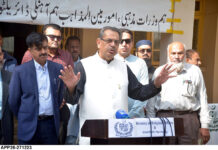
According to police, the man, identified as Bahadur Rind, killed his 32-year-old wife Zareena in village Tharo Rind with the help of his brother and hung her body from a tree outside his home. The couple had four children.
Police reached the crime scene and shifted the dead body to Garhi Yaseen Taluka Hospital for an autopsy. Meanwhile, the police arrested the accused and shifted him to Dakhan Police Station. Police are also conducting raids for the arrest of the co-accused in the incident.
According to local sources, the accused panicked after his wife was diagnosed with HIV in recent tests. He feared that other members of his family would contract AIDS from his wife. They said he had been forcing his wife to go back to her parents’ home so he could bring another wife to his home. Zareena was resisting his demand, which resulted in a regular domestic brawl, local people said. According to some locals, the man also accused his wife of having an extramarital affair.
Anger and fear continue to swell in the desperately poor villages and suburbs near neighbouring Larkana district affected by the epidemic, which authorities say could be linked to either gross negligence or malicious intent by a local doctor using tainted syringes.
Health officials say nearly 700 people, many of them children, have tested positive in recent weeks as experts warn of a surge in infection rates across the country due to the use of unsanitary equipment and rampant malpractice – often at the hands of quack doctors.
It is pertinent to mention here that in recent outbreak of Human Immunodeficiency Virus (HIV) in Sindh, four more cases of HIV were reported in Shikarpur. In Dakhan village of Shikarpur district, 356 people were screened for the potentially life-threatening condition of HIV, from which four were tested positive. After the Sindh government sought external help, the WHO sent its team of experts to control its spread. Pakistan was long considered a low prevalence country for HIV, but the disease is expanding at an alarming rate – particularly among intravenous drug users and sex workers. With about 20,000 new HIV infections reported in 2017 alone, Pakistan currently has the second fastest growing HIV rates across Asia, according to the UN.












